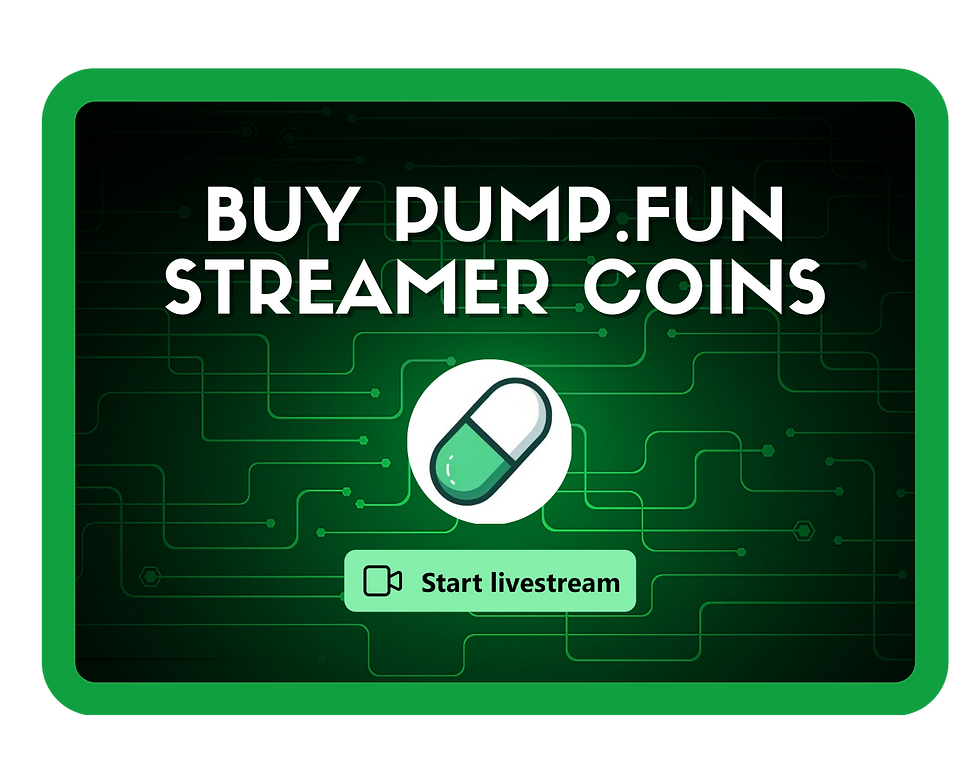How to Turn Your Crypto Hobby Into a Full-Time Job
- DEXROCKETS

- Nov 22, 2024
- 4 min read
Updated: Feb 17

Step 1: Evaluate Your Strengths and Interests
Before diving headfirst into the crypto world, assess your skills and interests. Crypto is a vast industry with roles spanning:
Trading: Active trading, swing trading, or bot-driven strategies.
Content Creation: Writing articles, blogs, or creating YouTube videos about crypto trends.
Development: Building blockchain projects, smart contracts, or dApps.
Marketing: Promoting crypto projects through social media, SEO, and community engagement.
Data Analysis: Evaluating blockchain data or market trends for insights.
Community Management: Supporting crypto communities and managing Discord/Telegram channels.
Identify where your strengths align with opportunities in the crypto space. For example, if you love analyzing charts, trading might be your path. If storytelling is your forte, content creation could be your calling, to your full-time crypto job.
Step 2: Build a Strong Knowledge Foundation
The crypto industry moves fast, and staying informed is crucial. Make a habit of consuming high-quality resources such as:
News Platforms: CoinDesk, The Block, and Decrypt provide daily updates.
YouTube Channels: Follow reputable influencers like Coin Bureau or DataDash.
Online Courses: Platforms like Coursera, Udemy, or Binance Academy offer blockchain and trading courses.
Social Media: Twitter (or X) and Reddit have active communities for discussions and insights.
Remember, knowledge is power. The more you understand about blockchain, smart contracts, DeFi, and emerging trends, the better equipped you’ll be to carve out your niche.
Step 3: Start Small and Experiment

If you’re still a hobbyist, use this phase to experiment. Dip your toes into different areas to find what resonates most with you. Here’s how:
1. Try Trading
Trading crypto is one of the most accessible entry points. Begin by:
Practicing on demo accounts or with small amounts of capital.
Learning technical analysis, including chart patterns and indicators.
Exploring automated bots to refine strategies.
2. Create Content
Share your insights on platforms like Medium, Twitter, or YouTube. Topics could include:
Project reviews.
Market analysis.
Tutorials for beginners.
3. Join a Community
Engage with crypto communities on Telegram, Discord, or niche forums. Being active can lead to networking opportunities and help you understand community dynamics.
Step 4: Develop Marketable Skills
Once you’ve identified your interests, focus on honing the necessary skills.
For Developers
Learn Solidity for Ethereum smart contracts.
Master blockchain frameworks like Polkadot or Solana.
Experiment with NFTs, DeFi protocols, or Layer 2 solutions.
For Content Creators
Improve your SEO writing skills.
Learn video editing for creating engaging content.
Build a personal brand on social media.
For Analysts and Traders
Explore advanced trading strategies like arbitrage or algorithmic trading.
Learn tools like TradingView, Dune Analytics, and Glassnode.
Understand risk management to minimize losses.
Step 5: Transition Gradually
Quitting your current job to go all-in on crypto might seem tempting, but a gradual transition is often wiser.
Side Hustle: Start by earning part-time income from trading, freelancing, or content creation in the crypto space.
Save Capital: Build a financial buffer for at least six months to a year.
Test the Waters: Take on short-term gigs or projects to gauge the viability of a full-time commitment.
Step 6: Explore Income Streams

Diversity is key when working full-time in crypto. Consider combining multiple income streams:
1. Trading and Investing
Active trading for short-term gains.
Long-term holding of high-potential projects (HODLing).
Yield farming or staking for passive income.
2. Freelancing
Platforms like Upwork, CryptoJobsList, and Gitcoin often feature opportunities in:
Content writing.
Smart contract auditing.
Community management.
3. Creating and Selling NFTs
If you’re an artist or developer, NFTs can provide lucrative opportunities. Explore platforms like OpenSea or Magic Eden to monetize your work.
4. Launching Your Own Project
Have an innovative idea? Build a project, whether it’s a meme coin, DeFi protocol, or an educational platform. However, ensure your project adds value and isn’t just a quick cash grab.
Step 7: Network Aggressively
Networking can be a game-changer in the crypto industry. Attend conferences, participate in Twitter Spaces, and engage with influencers in your niche. Platforms like LinkedIn and Discord are excellent for finding mentors and collaborators.
Step 8: Stay Adaptable
The crypto world is notorious for its volatility—not just in prices but also in trends. What’s hot today (like NFTs) could cool down tomorrow. Stay flexible and open to learning new skills to remain relevant.
For example, if DeFi is your focus, keep an eye on emerging sectors like real-world asset tokenization or ZK-rollups. If you're into trading, adapt to shifting market conditions by exploring different strategies.
Common Pitfalls to Avoid
Overleverage: Avoid risky trades that could wipe out your portfolio.
Scams: Stay vigilant against fraudulent projects and phishing attempts.
Burnout: Working in crypto can be mentally taxing. Set boundaries and take breaks.
Overdependence on One Income Source: Diversify your income streams to reduce risk.
How to Get Full-Time Crypto Job?

Transitioning from a crypto hobbyist to a full-time professional is challenging but achievable. By leveraging your strengths, continuously learning, and exploring diverse income streams, you can carve out a sustainable career in this dynamic industry.
Remember, success in crypto isn’t just about luck or timing—it’s about consistent effort, calculated risks, and a willingness to adapt. The journey won’t be easy, but for those passionate about blockchain technology and its potential, the rewards can be life-changing.
So, are you ready to take the plunge?
.png)



Comments